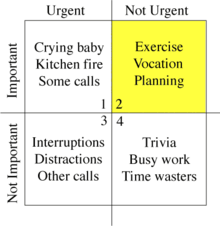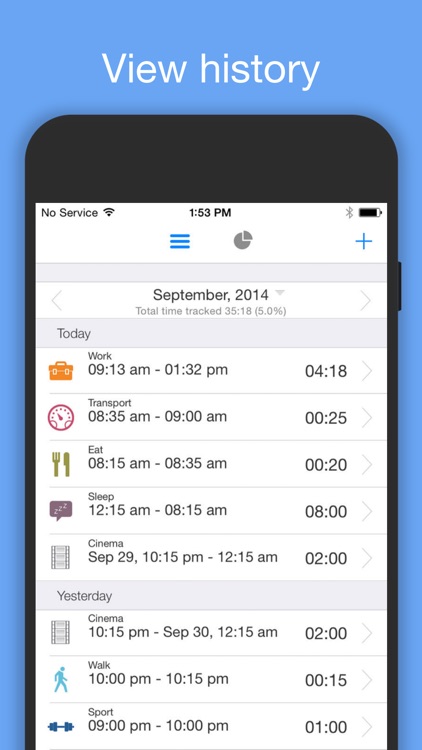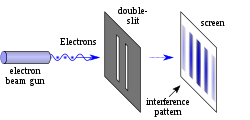In this article, I will talk about my understanding and implementation of time management measures. Moreover, I would introduce some popular concepts of this topic, like GTD, Pomodoros,The Eisenhower Method.
Understanding of Time management
What it is? What’s its importance?
Time management is the process of carefully planning time individuals spent on various activities. The aim of the time management is to increase efficiency and productivity. For a simple example, suppose you need to prepare dinner for your family, you need to complete a set of tasks like shopping for groceries, preparing ingridients, cooking, etc. Time management skills tend to help you reduce the overall time spent on all this tasks by arranging them consciously.
In computer science, the design of operating system provides an abstraction on this topic via CPU scheduling.
- The priorities of tasks resembles the real life situation where some tasks is more urgent than others.
- The overhead of context switch (switching between tasks) is a vivid abstraction of human changing focus.
- For a difficult task (takes more time), it was split into more time slices to complete.
Popular Concepts
The Eisenhower Method
It is a method that utilizes the criteria of importance and urgency to organize priorities and workload. Based on the two criteria, tasks could be categorized into four categories (as in following graph)

- Important & Urgent tasks - should be done immediately and in person.
- Important & Not Urgent tasks - should be done at certain dates and in person.
- Unimportant & Urgent tasks - could be delegated.
- Unimportant & Not Urgent tasks - should be dropped.
In practice, it is not frequently listed but used as a mental model to decide the task’s properties.
Pomodoros
This method was originally from Francesco Cirillo's Pomodoro Technique. It took the name from a Pomodoro - tomato shaped kitchen timer. The “Pomodoro” is defined as the fundamental unit of time to measure tasks’ expected completion time, which is traditionally defined as being 30 minutes long, consisting of 25 minutes of work and 5 minutes of break time.
Though it may seems stiff to use strict pomodoros, it could actually develop your sense of time and help you record your performance. With continuous using of this technique, you could be more confident in predicting tasks’ completion time. Recoding how many Pomodoros you finished could also be a straight forward metric of evaluating your performance.
GTD
This strategy was created by David Allen in his book Getting Things Done. The basic idea of this strategy is to capture all unfinished things (projects or tasks), clarify them into small actionable tasks with clear goals, organize them in appropriate forms (and come up to you at proper time), review tasks frequently to update the status and engage in these tasks.
In general, it provides a complete workflow for you to manage all your tasks and projects in a personalized system. Though this system may be hard to build and maintain, from my own experience, it is worthwhile to keep you confident in action decisions.
My implementation of time management
To start with your time mangement, you frist need to be aware of
where you spent your time. I used aTimeLogger to track my
everyday activities. This is the start of my time management practice
and could provide a clear view of whether you are hard working or
playing too much. You could also pick your own time tracking app, just
pay attention to the philosophy of the software to make sure they are
NOT interruptive of your current activities and time-consuming when
recording.

To plan your time carefully and wisely, I used GTD techniques to track all the tasks I need to finish and all the events I need to participate. Following GTD’s principles, I would tag the tasks with its expected context (when would be proper, what tools needed, etc.) and group them with the assoicated project. I have tried plenty of task management apps like Omnifocus (which I am now using), Things 3, TickTick (Used for a long time), Wunderlist, etc. It is hard to give a general suggestion for the choice as different people may have different requirements, just make sure the app you choose helps record your tasks easily, intergrate nicely with your workflow and remind you in appropriate format.
One more thing to care about, is DO NOT overmanaging. I had once fallen into the pitfall of overmanaging myself. I enjoyed listing and categorizing different tasks and projects, trying different apps, perfecting the tag system but just NOT complete many of those tasks. Remember what the name suggest, getting things done, so focus on completing the tasks rather than putting most of your efforts changing their organization.
In the new information era, another thing has become more valuable than our time, that is, our attention (or effective time). The power of attention has long been discovered by physicist through Double-slit experiment, in which whether observer exists could impact the results of the inference pattern.

Modern business are even using our attention to gain money (through online advertisement). We need to pay attention to what we paid our attention to. What you should do, is paying attention to the four things below:
- focusing on valuable things
- relationships, especially intimacy
- finding new trends
- Self development
Pomodoros is therefore been introduced to my system
to record my attention (though it has way more potentials as introduced
above). You could easily track your progress and performance via
pomodoro recoding. I am now using Session as the app to
record for its elegant visualizations and ease of use.